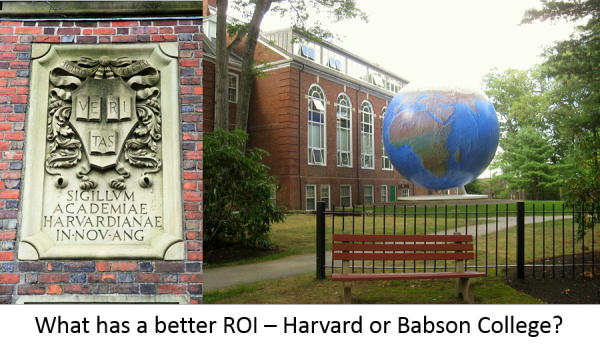How much is getting into a top ranked college worth? One family from Hong Kong offered up to $400K to a popular Silicon Valley consultant to get their “C” average student into a top ranked school. This raises many questions, but I’ll concentrate on just a few. Is getting into an Ivy really worth $400K? What are these rankings anyway? Are rankings and reputation the best way to select a college? How does one make a final selection between colleges? My family encountered these questions when Number One Son didn’t get into his top choice and had to decide where to register between the colleges that admitted him. When I took a closer look at a variety of ratings and rankings, I found a number of interesting points that I think are relevant to Asian American parents and parents in general.
 One of the most popular college rankings is from US News and World Report. It uses criteria like selectivity, graduation rates, and standardized test scores. It’s obvious the higher the rank, the better, right? Not so obvious. Like many things, it depends, and with college ranking systems, it depends on many different factors and how they are weighed. For example, this ranking system from from Payscale looks at the Return On Investment (ROI) from tuition and resulting salaries. Is Harvard or Stanford at the top? No, it’s Harvey Mudd College. Babson College, a small college focused on business, is higher than Stanford and Harvard (Harvard didn’t even crack the top 10 when I checked). Want to work at Apple? Apple employs more engineers from San Jose State than from Stanford.
One of the most popular college rankings is from US News and World Report. It uses criteria like selectivity, graduation rates, and standardized test scores. It’s obvious the higher the rank, the better, right? Not so obvious. Like many things, it depends, and with college ranking systems, it depends on many different factors and how they are weighed. For example, this ranking system from from Payscale looks at the Return On Investment (ROI) from tuition and resulting salaries. Is Harvard or Stanford at the top? No, it’s Harvey Mudd College. Babson College, a small college focused on business, is higher than Stanford and Harvard (Harvard didn’t even crack the top 10 when I checked). Want to work at Apple? Apple employs more engineers from San Jose State than from Stanford.
Do Asian parents focus too much on rank and reputation for college selection? Not all, but many do. Services like that Silicon Valley consultant I mentioned or these coaching consultancies meet demand that is largely Asian American. I know one Asian American whose parents wouldn’t let him go to Carnegie Mellon University because they hadn’t heard of it, instead preferring a UC that did not have as good a CS department. My parents would needle Number One Son about not applying to Ivy League schools even though he did not want to.
Colleges game ranking systems. Some encourage applicants who don’t have a chance of getting in order to increase their selectivity numbers. Syracuse University tried to be more inclusive and ignore the ranking game but after criticism from students and alumni about declining rankings, they changed their mind.
With the Daughter, she got into her number one choice, but Number One Son did not. He asked me for help in deciding between his remaining choices, so I created a decision matrix like this one in a spreadsheet. The matrix took into account many criteria, ranging from cost, location, and weather to graduation rates and average starting salaries. Other key factors were placement rates – what percentage of students either got jobs or work out of college and how well rounded and diverse the college is. The key difficulty with such a matrix is that it is hard to really weigh things properly. My personal preference was that he go to a much broadly focused university and not consider things like ROI and salaries of graduates – education is more than just getting job skills.
In the end, Number One Son ignored my weightings and rankings and instead went with engineering focused school – the one that was cheapest but had a high placement rate and the highest average starting salary of his final choices. The school’s Boston location was a key factor. Also, the fact that his girlfriend will go to a school only an hour away certainly made a difference, and it also shows that he was not only thinking about job skills! In any case, he made a perfectly viable choice that was almost half the cost of his most expensive option and which has a better ROI (according to Payscale) than his top choice that rejected him. The wife and I wanted him to make the decision himself, and it worked out to be the best one for us financially.
(Harvard photo credit: Ingfbruno via the CC BY-SA 3.0)
Previous Parts:
- Part 1: Picking Schools
- Part 2: Race and School Selection
- Part 3: An Admissions Officer Speaks!
- Part 4: The School Visit
- Part 5: The Admissions Consultant
- Part 6: Admissions Test Preparation
- Part 7: Applications
- Part 8: The Interview
- Part 9: Aftermath
- Excited
- Fascinated
- Amused
- Disgusted
- Sad
- Angry









